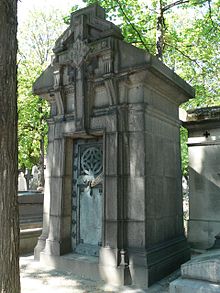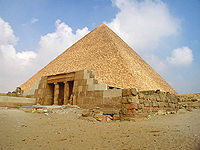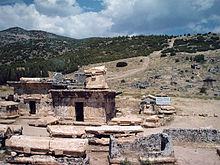- Tomb
-
"Tombs" redirects here. For other uses, see Tombs (disambiguation).
A tomb (from Greek: τύμβος - tumbos[1]) is a repository for the remains of the dead. It is generally any structurally enclosed interment space or burial chamber, of varying sizes. The word is used in a broad sense to encompass a number of such types of places of interment or, occasionally, burial, including:
- Burial vaults – stone or brick-lined underground spaces for interment (rather than burial), originally vaulted, often privately owned for specific family groups; usually beneath a religious building such as a church or in a churchyard or cemetery
- Church monuments – within a church (or tomb-style chests in a churchyard) may be places of interment, but this is unusual; they more commonly stand over the grave or burial vault rather than containing the actual body and are therefore not tombs
- Crypts – often, though not always, for interment; similar to burial vaults but usually for more general public interment
- Hypogeum tombs - stone-built underground structures for interment, such as the tombs of ancient Egypt
- Martyria - Mausolea for the remains of martyrs, such as San Pietro in Montorio
- Mausolea (including ancient pyramids in some countries) – external free-standing structures, above ground, acting as both monument and place of interment, usually for individuals or family group
- Megalithic tombs (including Chamber tombs) – prehistoric places of interment, often for large communities, constructed of large stones and originally covered with an earthen mound
- Sarcophagi – stone containers for bodies or coffins, often decorated and perhaps part of a monument; these may stand within religious buildings or greater tombs or mausolea
- Sepulchre – a cavernous rock-cut space for interment, generally in the Jewish or Christian faiths (cf. Holy_Sepulchre)
- Kokh – a rectangular rock-cut sloping space, running inward, like tunnels into rock, sufficiently high and wide to permit the admission of a corpse
- Architectural shrines – in Christianity, an architectural shrine above a saint's first place of burial, as opposed to a similar shrine on which stands a reliquary or feretory into which the saint's remains have been transferred
- Other forms of archaeological 'tombs' such as ship burials
- Rock-cut tombs, a form widespread in the ancient world, in which the tomb is not built but carved out of the living rock and can be a free-standing building but is more commonly a cave, which may be extensive and may or may not have an elaborate facade.
As indicated, tombs are generally located in or under religious buildings, such as churches, or in cemeteries or churchyards. However, they may also be found in catacombs, on private land or, in the case of early or pre-historic tombs, in what is today open landscape.
The tomb of Emperor Nintoku (the 16th Emperor of Japan) is the largest in the world by area. However, the Pyramid of Khufu in Egypt is the largest by volume.
References
See also
Categories:- Burial monuments and structures
- Subterranea (geography)
- Greek loanwords
Wikimedia Foundation. 2010.



